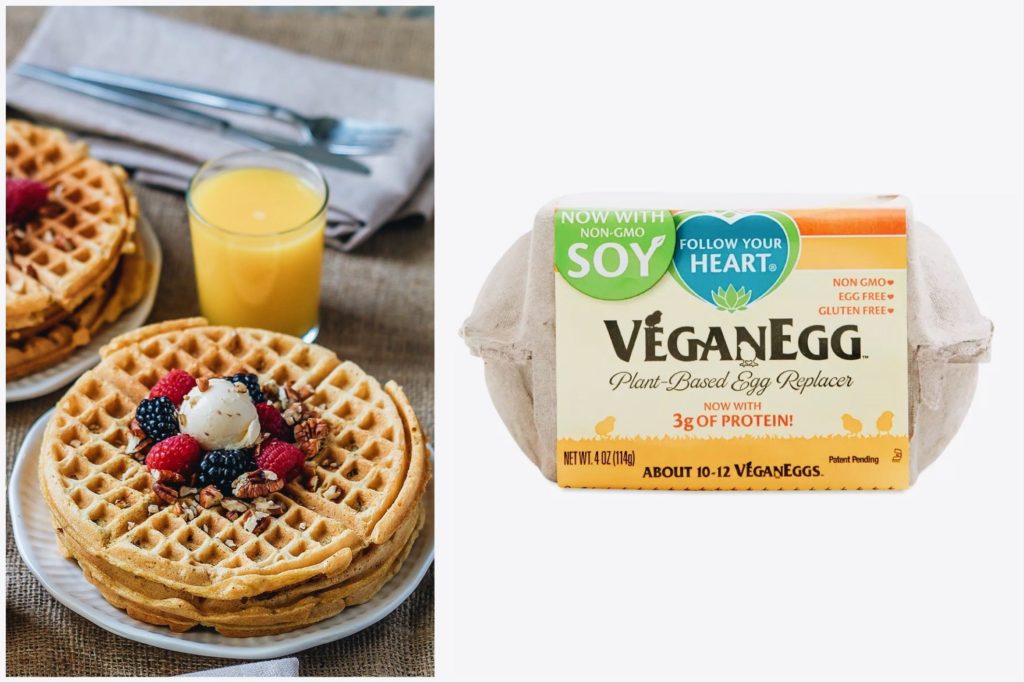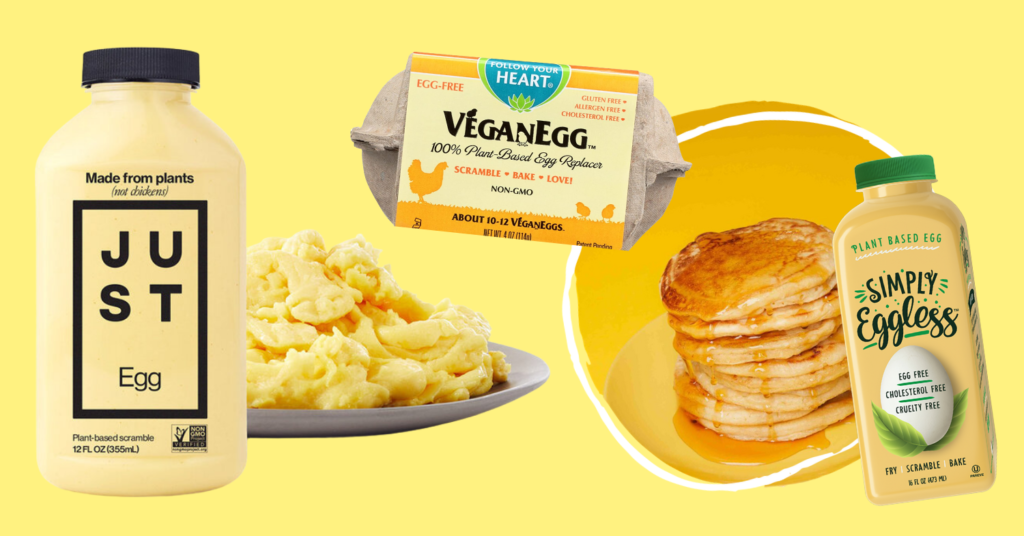Eggs are one of the world’s most popular foods. Humans have eaten them for centuries – in fact, it was the ancient Egyptians who first collected and hatched eggs in caves. Our farming methods have evolved since then, but from breakfast to dinner, eggs are still a staple many feel they can’t live without. But the industry isn’t without its problems. Environmental, ethical, and health concerns have led many people to ask: Is it possible to buy vegan eggs? And the answer to that question is a resounding yes. You can buy them, make them from scratch, or order them from a restaurant (it is 2021 after all).
To help you discover the wonder that is vegan eggs, we’ve put together a list of some of the best brands. But before we get to that, let’s run through a few FAQs.

What are vegan eggs?
It sounds like an oxymoron. And, well, it is. An egg, by definition, is an “oval or round object laid by a female bird, reptile, fish, or invertebrate.” Vegan eggs, clearly, are none of those things. Instead, they are a mixture of plant-based ingredients that mimic the taste, texture, and binding abilities of chicken eggs.
Brands have used all kinds of ingredients to get those signature egg-like characteristics. California-based Eat Just, for example, uses mung beans to create its plant-based liquid Just Egg.
Follow Your Heart, also based in California, uses a combination of soymilk powder, modified cellulose, and natural flavors, including nutritional yeast and black salt, for its egg replacer. Black salt (also known as kala namak) is a particularly common ingredient in egg alternative products because it has a strong egg-like sulphurous smell. (Pro tip: If you’re making your own eggs from scratch, just a sprinkle will do for that eggy hint.)

Are vegan eggs sustainable?
In the European Union alone, around seven million tonnes of eggs are produced every year. This means that, more often than not, the eggs on supermarket shelves come from intensive factory farm systems.
Chickens in factory farms are often caged, never see the light of day, and have very little room to move around. And those are the ones that survive. Commonly, male chicks born into the egg industry are slaughtered almost immediately (although some countries, like Germany, are now phasing this out). This is because they are unable to lay eggs, so are of no use to the industry.
Factory farms also place a significant strain on the planet. In 2018, a team of Spanish researchers investigated an intensive poultry farm in Asturias. The farm had 55,000 laying hens that produced more than 13 million eggs per year.
The researchers analyzed the environmental impact of egg production across 18 categories, including ozone depletion, climate change, terrestrial acidification, human toxicity, and land occupation. According to researcher Amanda Laca: “The most affected have been the transformation of the natural earth and the water and land toxicity.” (You can read more about the study here.)
Further research by The GRACE Communications Foundation, published by Quartz, notes that it takes 53 gallons of water just to produce one egg. This includes chicken feed, drinking, and irrigation.
Plant-based ingredients, however, have a reduced impact on the environment. According to Eat Just, its vegan liquid eggs use 98 percent less water, 86 percent less land, and have a carbon footprint that is 93 percent smaller “than conventional animal sources.” Per another vegan egg brand, Simply Eggless, its lupin bean-based eggs use 95 percent less water and have a carbon footprint that is 90 percent smaller than their animal-based counterparts.
Are vegan eggs healthy?
Vegan eggs are healthier than their chicken-derived counterparts in many ways. Firstly, they contain no cholesterol.
In high quantities, cholesterol, which is found in conventional eggs, can lead to an increased risk of cardiovascular disease. One study published in JAMA medical journal highlighted the risk of consuming three or more large eggs a week.
According to the study’s lead author, Victor Zhong, one large egg contains around 186 milligrams of cholesterol. The study found that consuming an additional 300 milligrams of dietary cholesterol a day was linked to a 3.2 percent increased risk of heart disease, and a 4.4. percent higher risk of early death.
Dr. Norrina Allen, another researcher, told The Independent: “We want to remind people there is cholesterol in eggs, specifically yolks, and this has a harmful effect.” She added, “As part of a healthy diet, people need to consume lower amounts of cholesterol. People who consume less cholesterol have a lower risk of heart disease.”
Vegan eggs are also TMAO-free. This toxic compound, full name trimethylamine oxide, is associated with a higher risk of heart disease and stroke. When choline (found in eggs) enters the body, it can be turned into TMAO by gut bacteria.
One of the main reasons people eat eggs is for protein, but many vegan egg products also offer high amounts of the nutrient. Eat Just’s folded egg has a whopping seven grams of protein per serving, for example. In contrast, a typical chicken egg contains six grams of protein.
Where to buy vegan eggs: 5 brands to try

Crackd
UK-based brand Crackd has created a vegan egg product that “cooks, bakes, acts, and tastes just like an egg.” You can fry it into an omelette, bake it into brownies, and you can even make quiches and frittatas with it, just like a regular chicken egg.
According to the brand, it took 22 attempts at creating powdered vegan eggs before its food scientists realized, in 2017, that “powdered egg is for ration books, not vegan cooks.”
After many more attempts at creating a suitable vegan egg product, Crackd’spea protein-based liquid egg hit the market in 2020. Rik Roberts, the general manager of Plant Heads (the venture behind Crackd), told LIVEKINDLY last year: “We chose pea protein because it is allergen-free, relatively low in its impact on the environment, and is also available in plentiful supply.”
He added: “We hope to deliver choice to consumers who would like to reduce the amount of animal protein they are eating, but do not want to compromise on taste, versatility, or ease of use. We hope that we have developed a product that mimics the behavior of an egg to such an extent that you will not notice the difference.” Brits can buy Crackd vegan eggs from The Vegan Kind Supermarket and select M&S Food Halls.

Just Egg
Eat Just’s Just Egg is arguably the most well-known vegan egg product on the market. Like Crackd, its signature product is liquid, and can be used as a direct egg substitute in a number of recipes. You can even scramble it.
As well as its liquid egg, the brand also offers Folded Plant Eggs. These are ideal for morning egg muffins and bagels, as they can be popped in the toaster or microwave and ready in minutes. Eat Just is also slated to launch vegan egg bites (similar to those you’d find at Starbucks) in March.
The brand is consistently expanding to new retailers and countries; it’s available in more than 19,000 grocers, and more than 500 foodservice locations. In January, Dicos fast-food chain in China replaced real eggs with Eat Just’s folded alternative.

Follow Your Heart
Follow Your Heart used to be a simple soup and sandwich counter. Now, it’s an international brand, available in more than 25 countries around the world. It specializes in healthy, sustainable, compassionate food and its product range includes vegan mayonnaise, cheese, and its VeganEgg. The versatile replacement, which comes in traditional egg box-style packaging, is ideal for baking sweet treats like muffins and cakes, and you can scramble it too.

Simply Eggless
Simply Eggless (created by Simply Brand Foods) accepts that eggs are tasty, but the brand doesn’t support factory farming involved in producing chicken eggs, which is harmful to animals and the planet. So it created its own vegan egg that tastes like an egg, but isn’t one. Its website reads: “Caging sweet little chickens, forcing them to lay 320 eggs over a short lifespan of about 72 weeks, isn’t the answer. But plant-based eggs are.”
Similar to Eat Just and Crackd, Simply Egg’s offering is liquid, but unlike the former, it’s made with lupin beans. They’re rich in protein and natural prebiotic fibers, which means they’re beneficial to gut health as well. You can find Simply Eggless in stores across the U.S., including select Wegmans and Buehlers.

Zero Egg
“Real taste with a featherlight footprint” is Zero Egg’s tagline. The Israel-based brand is on a mission “to empower the era of sustainable foods with a plant-based egg that’s better for everyone.” The product, which cooks, scrambles, and bakes like eggs (you know the drill), is made with a mixture of sustainable plant-based ingredients: chickpea, pea, soy, and potato proteins.
It’s available in two varieties: Egg Basics (for scrambling, etc) and Bake Basics (for, you guessed it, baking). Zero Egg is also working on vegan egg patties for quick-service restaurants. At the moment, Zero Eggs are available to foodservice operators and manufacturers across the U.S., Europe, and Israel.
The vegan egg industry is a growing market, with more brands and products launching all the time. Over the next few years, it’s going to become more common to opt for plant-based alternatives over the real deal. In fact, the industry is projected to reach a value of $1373.4 million by 2023.
So keep your eyes peeled for new and exciting products near you, in stores and restaurants. You never know, vegan egg muffins might become your new morning go-to.
LIVEKINDLY is here to help you navigate the growing marketplace of sustainable products that promote a kinder planet. All of our selections are curated by the editorial team. If you buy something we link to on our site, LIVEKINDLY may earn a commission.


